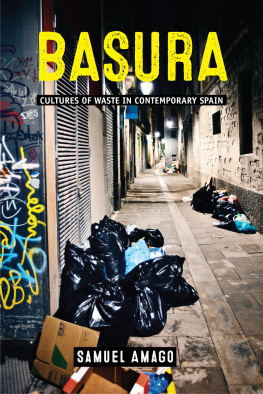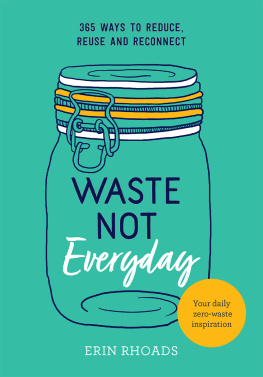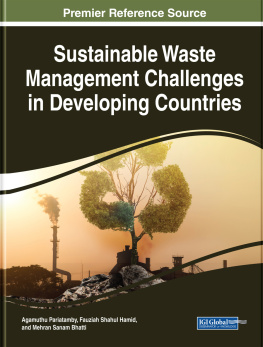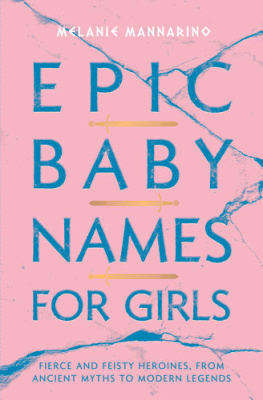Samuel Amago (author) - Basura: Cultures of Waste in Contemporary Spain
Here you can read online Samuel Amago (author) - Basura: Cultures of Waste in Contemporary Spain full text of the book (entire story) in english for free. Download pdf and epub, get meaning, cover and reviews about this ebook. year: 2021, publisher: University of Virginia Press, genre: Romance novel. Description of the work, (preface) as well as reviews are available. Best literature library LitArk.com created for fans of good reading and offers a wide selection of genres:
Romance novel
Science fiction
Adventure
Detective
Science
History
Home and family
Prose
Art
Politics
Computer
Non-fiction
Religion
Business
Children
Humor
Choose a favorite category and find really read worthwhile books. Enjoy immersion in the world of imagination, feel the emotions of the characters or learn something new for yourself, make an fascinating discovery.
- Book:Basura: Cultures of Waste in Contemporary Spain
- Author:
- Publisher:University of Virginia Press
- Genre:
- Year:2021
- Rating:5 / 5
- Favourites:Add to favourites
- Your mark:
- 100
- 1
- 2
- 3
- 4
- 5
Basura: Cultures of Waste in Contemporary Spain: summary, description and annotation
We offer to read an annotation, description, summary or preface (depends on what the author of the book "Basura: Cultures of Waste in Contemporary Spain" wrote himself). If you haven't found the necessary information about the book — write in the comments, we will try to find it.
Basura: Cultures of Waste in Contemporary Spain — read online for free the complete book (whole text) full work
Below is the text of the book, divided by pages. System saving the place of the last page read, allows you to conveniently read the book "Basura: Cultures of Waste in Contemporary Spain" online for free, without having to search again every time where you left off. Put a bookmark, and you can go to the page where you finished reading at any time.
Font size:
Interval:
Bookmark:
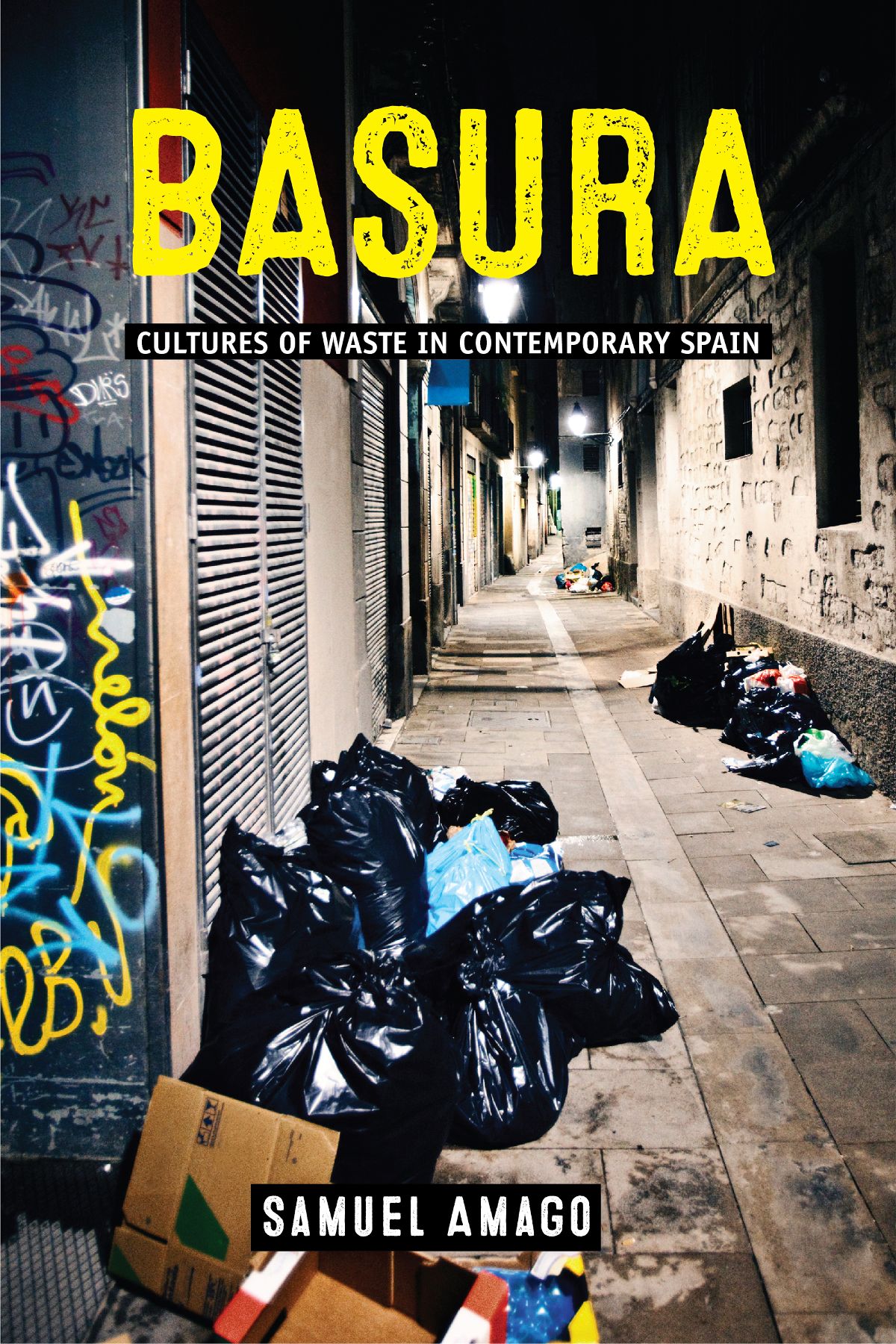
Under the Sign of Nature: Explorations in Ecocriticism
Serenella Iovino, Kate Rigby, and John Tallmadge, Editors
Michael P. Branch and SueEllen Campbell, Senior Advisory Editors
Samuel Amago
University of Virginia Press
Charlottesville and London
University of Virginia Press
2021 by the Rector and Visitors of the University of Virginia
All rights reserved
First published 2021
Library of Congress Cataloging-in-Publication Data
Names: Amago, Samuel, author.
Title: Basura : cultures of waste in contemporary Spain / Samuel Amago.
Description: Charlottesville : University of Virginia Press, 2021. | Series: Under the sign of nature : explorations in ecocriticism | Includes bibliographical references and index.
Identifiers: LCCN 2021001499 (print) | LCCN 2021001500 (ebook) | ISBN 9780813945910 (hardcover) | ISBN 9780813945927 (paperback) | ISBN 9780813945934 (epub)
Subjects: LCSH: Refuse and refuse disposalSocial aspectsSpain. | Refuse and refuse disposal in art. | Refuse and refuse disposal in literature. | Refuse and refuse disposal in motion pictures. | SpainEnvironmental conditions. | SpainCivilization.
Classification: LCC HD4485.S7 A43 2021 (print) | LCC HD4485.S7 (ebook) | DDC 363.72/80946dc23
LC record available at https://lccn.loc.gov/2021001499
LC ebook record available at https://lccn.loc.gov/2021001500
Cover art: peeterv/iStock
This book begins with an easy chair and ends with a baby rattle. It is a book about the material affordances of trash that explores how contemporary Spanish culture has engaged variously with the debris it has created and cast aside. Readers will find that the methods and theories it employs are eclectic, perhaps unsatisfyingly so; there are chapters on cinema, digital and chemical photography, archaeology, drawing, comics, literature, and ecology, each one deploying theoretical and critical approaches dictated mainly by those media but also by the stuff that inspired this book: basura.
This book puts forward an experimental counternarrative of contemporary Spanish culture from the perspective of wasted things. It asks questions like, What makes trash trash? How do we decide what to throw away? What transpires once our discards have been cast aside? What happens when sanitation workers stop taking away our rubbish? Who benefits from keeping things clean? Why do some parts of Spain look so sterile today, and what happened to the rubbish that used to be more visible? Why is Pedro Almodvar obsessed with plastic and actual physical trash? What does Spanish waste-space look like, and where is it located? Who gets to live in the city, and who is ejected from the body politic? How does waste shape our experience of time? What happened to the Spanish past? Are we junk?
More than putting forward a broad new theory of contemporary Spain, this book is comprised of a series of case studies that rehearse different ways of answering those questions. Inspired in part by the purposefully promiscuous modes of noticing that recent ecocritical and new materialist theory and philosophy have put forward, I set out like a trapero (ragpicker) to assemble a series of objects that might convey some of the redolence and affective power of contemporary Spanish ejectimenta. I am not the first to take this approach. My colleague Maite Zubiaurre and her alter ego Filomena Cruz got here first, the former with her computer and the latter with her camera and art materials. Their book, Talking Trash: Cultural Uses of Waste, is an enchanting gambol through the wastepaper basket of Western culture, from Berlin to Barcelona, and from Los Angeles and New York to the North American Borderlands.
The scope of my book, which focuses on contemporary Spain, is more modest, but the project began some time ago. Fragments of chapters 4 and 6 appeared in 2007 and 2011, in the form of two unrelated essays: Narratives, Bodies and the Self in Rosa Monteros La hija del canbal, published in the Bulletin of Spanish Studies 84, no. 8 (2007): 102942, and On the Archaeological Impulse in Contemporary Spanish Narrative Fiction, also printed in the Bulletin of Spanish Studies 88, no. 78 (2011): 32743. Portions of chapter 2 appeared in electronic format, in Spanish, in Revista de ALCES XXI: Journal of Contemporary Spanish Literature & Film, with the title Basura, cultura, democracia en el Madrid del siglo veintiuno, 2 (201415): 3269. Those earlier forays into trash studies are included here in revised form with permission from the publishers. Rather than evidence of self-plagiarism, I would like to propose that the reappearance of those earlier essays is a reflection of the way that all things have a tendency to come back after we think we are done with them. Rummaging through my past work I found reminders that I have always liked digging in the dirt. This book is not just an archaeology of contemporary Spanish culture but also an archaeology of my own intellectual archive.
One of the theses of this book is that encounters with waste can be transformative. On the one hand, they create new ways of seeing and thinking, and, on the other, they create new relations between people and things. My work on waste has been sustained by an array of relations with people, places, and things over the last fifteen years. In addition to my students, I want to acknowledge Sindo Amago, Javier Herrero, Juan Carlos Gonzlez Espitia, Cristina Carrasco, Matthew Marr, Emil Keme, Teresa Chapa, Celia Mora Amago, Jordi Mar, Oswaldo Estrada, Iaki Prdanos Garca, Jessica Folkart, Kathy Everly, Eugenia Afinogunova, Joanne Britland, Emiliano Guaraldo, Nieves Gonzlez Fuentes, Charlotte Rogers, Kate Good, Rhi Johnson, Neil Anderson, Miguel Valladares Llata, Megan Saltzman, Susan Larson, Jill Robbins, Federico Luisetti, Serenella Iovino, Palmar lvarez Blanco, Debra Ochoa, the Department of Spanish, Italian, and Portuguese at the University of Virginia, the Department of Spanish and Portuguese at UT Austin, and the Department of Romance Studies at UNCChapel Hill. To the class of Fellows with whom I shared a transformative spring 2017 semester in residence at UNCChapel Hills Institute for Arts and Humanities, I express my fond appreciation, especially to Morgan Pitelka, Dan Sherman, Lien Truong, Dave Pier, Gabe Trop, Meenu Tewari, Bev Taylor, Deborah Gerhardt, Molly Worthen, Philip Hollingsworth, and Michele Berger.
I am particularly grateful to Juan Mora Amago, who posted to Facebook the Bankia image that emerged from the 2013 sanitation workers strike and that set up my later thinking on waste and space in Madrid, and his father, Juan Ramn Mora Ruiz, who in the 1980s guided me through the vitally filthy Madrilenian bar scene, well before I was of age. My aunt, Dolores Amago Flrez, taught me a lot about the neoliberal logics of waste and recycling in democratic Madrid, especially in and around Majadahonda. JoAnn and Gary Keenan have been lively and supportive interlocutors on the topic of obsolescence, planned or otherwise. Adam Cohn played a crucial role in taming the manuscript, its citations, and its images. Barbara Amago is the best indexer and editor ever. Boyd Zenner, senior acquiring editor extraordinaire, was a joy to work with, as was Susan Murray, my books eagle-eyed copy editor. I thank Mark Saunders for taking an interest in my project, enlisting me with the University of Virginia Press, and treating me to a sandwich at the Oakhurst Inn. You will be missed.
Next pageFont size:
Interval:
Bookmark:
Similar books «Basura: Cultures of Waste in Contemporary Spain»
Look at similar books to Basura: Cultures of Waste in Contemporary Spain. We have selected literature similar in name and meaning in the hope of providing readers with more options to find new, interesting, not yet read works.
Discussion, reviews of the book Basura: Cultures of Waste in Contemporary Spain and just readers' own opinions. Leave your comments, write what you think about the work, its meaning or the main characters. Specify what exactly you liked and what you didn't like, and why you think so.

